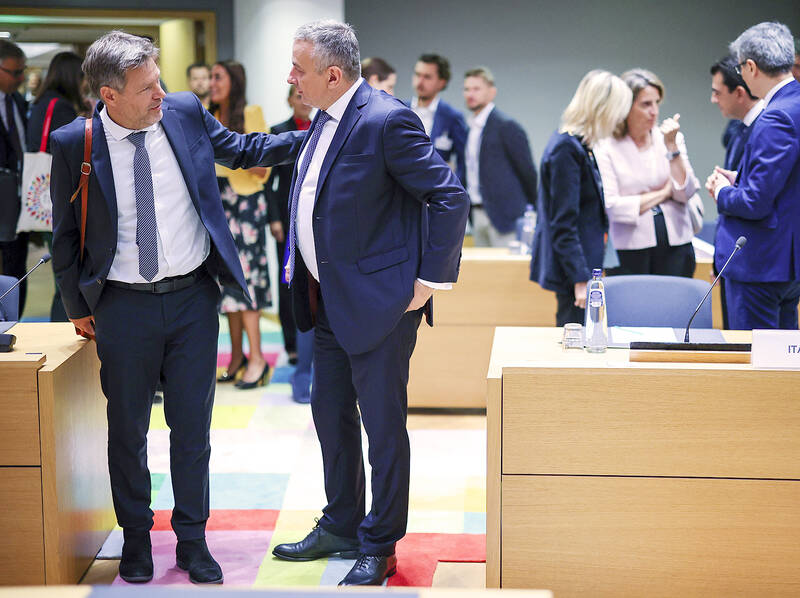EU energy ministers met on Friday to seek agreement on ways to shield citizens from sky-high energy prices and prevent power utilities from collapsing as Russia gradually turns off gas supplies to Europe in the standoff over Ukraine.
EU diplomats said that member states broadly back proposals to help power providers from being crushed by a liquidity crunch, but are divided about plans to cap Russian gas prices.
Russia, which supplied Europe with a third of its gas supplies until its invasion of Ukraine, has said it would turn off supplies completely if a cap is imposed.

Photo: AP
Friday’s ministerial talks aim to whittle down options to those with broad support before presenting formal proposals, rather than reaching a final decision.
“We are in an energy war with Russia,” Czech Minister of Industry and Trade Jozef Sikela said as he arrived at the emergency Brussels meeting. “We have to send a clear signal that we would do whatever it takes to support our households, our economies.”
Energy bills, already surging as demand for gas recovers from the COVID-19 pandemic, rocketed higher still after Russia invaded Ukraine and the West imposed sanctions on Moscow. Governments have been scrambling to limit the price shock.
The European Commission has proposed offering emergency liquidity for power firms facing soaring collateral requirements, a move diplomats said EU governments broadly support. Some also back proposals to curbing power demand.
“I’m pretty sure we will align on liquidity measures to help companies,” Sikela said, adding that ministers would strive for a deal to “calm down the markets and not make them nervous.”
However, diplomats said the price cap proposal divided opinion, with some saying it would not help given Moscow’s deliveries to Europe have plummeted. Some central European states that still receive Russian gas fear losing it completely.
“There is not that much Russian gas coming to Europe, so I don’t see the added value of [a Russian gas price cap],” Belgian Minister of Energy Tinne Van der Straeten said.
Baltic states are among those backing the idea, saying a cap would deprive Moscow of cash to fund military action in Ukraine.
“Russia has said if you want our gas, take down the sanctions. It is blackmail. We cannot back down, we have to be united, we have to have the political will to help Ukraine win,” Estonian Minister of Economic Affairs and Infrastructure Riina Sikkut said.
An idea to claw back revenues from non-gas power generators and spend the cash on cutting consumer bills has also stirred resistance in some European capitals.
The EU proposal would cap the price non-gas generators are paid for power at 200 euros (US$202.14) per megawatt-hour, applying to wind, nuclear and coal generators, according to a draft proposal.
France, home to Europe’s largest nuclear power fleet, questioned whether the same limit should be applied to all generators.

Taiwan’s rapidly aging population is fueling a sharp increase in homes occupied solely by elderly people, a trend that is reshaping the nation’s housing market and social fabric, real-estate brokers said yesterday. About 850,000 residences were occupied by elderly people in the first quarter, including 655,000 that housed only one resident, the Ministry of the Interior said. The figures have nearly doubled from a decade earlier, Great Home Realty Co (大家房屋) said, as people aged 65 and older now make up 20.8 percent of the population. “The so-called silver tsunami represents more than just a demographic shift — it could fundamentally redefine the

The US government on Wednesday sanctioned more than two dozen companies in China, Turkey and the United Arab Emirates, including offshoots of a US chip firm, accusing the businesses of providing illicit support to Iran’s military or proxies. The US Department of Commerce included two subsidiaries of US-based chip distributor Arrow Electronics Inc (艾睿電子) on its so-called entity list published on the federal register for facilitating purchases by Iran’s proxies of US tech. Arrow spokesman John Hourigan said that the subsidiaries have been operating in full compliance with US export control regulations and his company is discussing with the US Bureau of

Businesses across the global semiconductor supply chain are bracing themselves for disruptions from an escalating trade war, after China imposed curbs on rare earth mineral exports and the US responded with additional tariffs and restrictions on software sales to the Asian nation. China’s restrictions, the most targeted move yet to limit supplies of rare earth materials, represent the first major attempt by Beijing to exercise long-arm jurisdiction over foreign companies to target the semiconductor industry, threatening to stall the chips powering the artificial intelligence (AI) boom. They prompted US President Donald Trump on Friday to announce that he would impose an additional

China Airlines Ltd (CAL, 中華航空) said it expects peak season effects in the fourth quarter to continue to boost demand for passenger flights and cargo services, after reporting its second-highest-ever September sales on Monday. The carrier said it posted NT$15.88 billion (US$517 million) in consolidated sales last month, trailing only September last year’s NT$16.01 billion. Last month, CAL generated NT$8.77 billion from its passenger flights and NT$5.37 billion from cargo services, it said. In the first nine months of this year, the carrier posted NT$154.93 billion in cumulative sales, up 2.62 percent from a year earlier, marking the second-highest level for the January-September